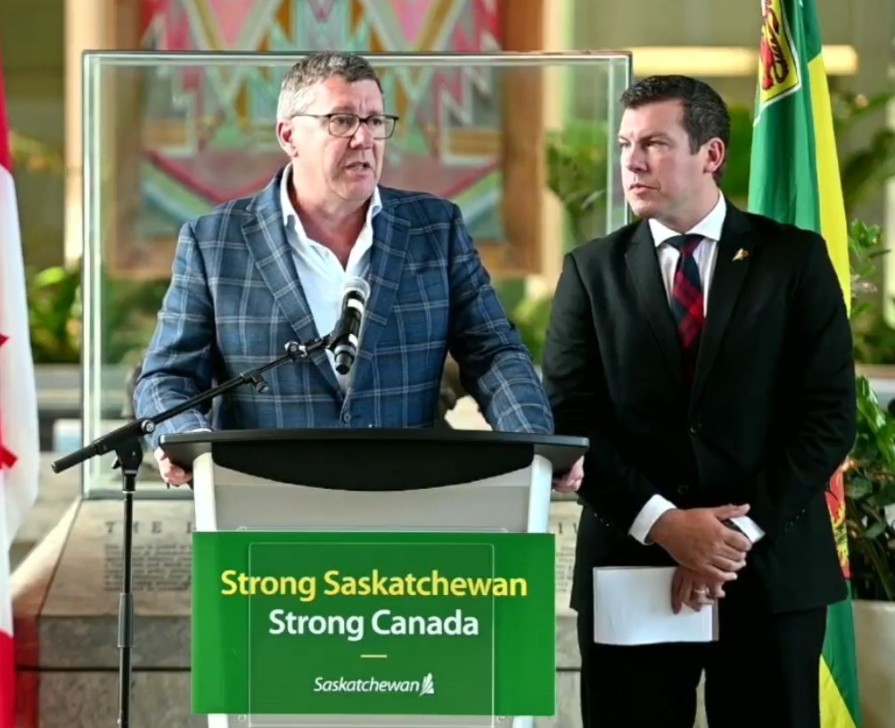When it comes to restoring our canola trade with China, the Canadian canola industry wants to see action and engagement from all levels of government, with everyone working together to protect our market share.
Premier Scott Moe, along with his Agriculture Minister Darryl Harrison and Trade and Export Minister Warren Kaeding, met with federal/provincial canola groups, as well as exporters, canola crush and value-added companies.
Kody Blois, the Parliamentary Secretary to the Prime Minister, was also in Saskatoon for the meeting, while Federal Agriculture Minister Heath MacDonald and Saskatchewan Liberal MP Buckley Belanger were virtual due to airport issues.
The focus of the meetings was to discuss the trade challenges with Canadian canola and China.
Last week, China implemented a preliminary 75.8 per cent duty on Canadian canola seed last week, in addition to the 100 per cent tariffs they implemented in March on Canadian canola meal, canola oil and peas.
The Premier and MP Kody Blois addressed the media following the meetings on Thursday.
Moe outlined the importance of the meeting and having everyone at the table, given the size and scope of the canola industry, which is valued at $43 billion and employs over 200,000 Canadians every day.
He says they had some good discussions focusing on three main directives, the first of which focused on the need for action and engagement at all levels to protect our market share. Second is ultimately, at some point in time, should this temporary tariff last for any degree of/or period of time, we will have to work together to signal that we are there to support the canola industry, the exporting industry, and our agrifood industry more broadly. Thirdly is the need to control what we can control.
"Controlling the domestic market that we may have today and tomorrow in the canola industry, but also ensuring that we're working alongside one another to control the regulatory environment. So that all of the industries that are employing and providing opportunity for Canadian families from coast to coast to coast is a regulatory industry that is allowing for that investment, and is a regulatory industry that is allowing for the sustainable production of the products that we in this province export to over 160 countries around the world."
Moe, who is planning a trip to China next month, says Saskatchewan - which grows 50 per cent of our national canola crop - has a tremendous stake and part to play in advancing discussions with China.
"It is our responsibility, I would say, as governments, to navigate what are at times very challenging market access conversations. We're here to do that from a provincial perspective to work in lock step with our federal government to ensure we're able to get there sooner rather than later."
He says that it is going to happen by our federal government and the Prime Minister meeting with President Xi. And finding our way not only I would say to the opportunity and a better place with respect to the canola industry, but the opportunities we might have more broadly across Canada in expanding our trade and expanding additional production of all industries to a place like China."
Kody Blois, the Parliamentary Secretary to the Prime Minister, says the federal government is engaging with Chinese authorities.
"In fact, next week there is what's called the Joint Economic and Trade Commission. This is an opportunity for Canadian authorities and Chinese authorities to engage on what we see as differences around trade. The premier has highlighted the desire for more federal presence. The Prime Minister is cognizant of this because we know what that market impact means for Canadian canola farmers. "
He notes that when it comes to other regulatory pieces that we can take on, there is some work that the government has been doing.
"I don't want to get out in front of the Prime Minister in terms of what that could look like, but there are a number of options on the table that we could take in the short term to help support the industry from the regulatory side. Things that industry has been calling for, whether at the producer level or the processor level. So the message from the Government of Canada is very clear: we're very pleased to be here. Thank you, Premier Moe, for organizing this. The Prime Minister is looking to be in Western Canada in the next couple of weeks. We'll have more to say on what a series of measures could look like to support the industry. Today's conversation is going to play into that, and we're deeply aware of the impact of what this means in Western Canada. You know, so to those who are involved in the canola industry from a producer level. We know the anxiety of the uncertainty of the market access right now. What this means. We have tools at our disposal. We know your value, and we're going to work hand in hand with the Government of Saskatchewan to see what we can do to mitigate the situation."
Blois notes that the Prime Minister is committed to being in Western Canada soon.
In a press release from Federal Agriculture Minister Heath MacDonald, he emphasized the government’s suite of business risk management (BRM) programs and how Canada is developing a comprehensive industrial strategy to help businesses develop new export opportunities in international markets.
